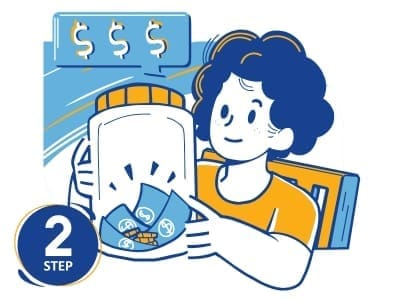
Learn2Earn Rewards!

Age 7: Smart Spenders
Understanding Needs, Wants, and Everyday Spending
Your child is starting to make everyday money decisions, like choosing between snacks at the store or picking out a small toy with their allowance. That growing independence makes this the perfect time to introduce key concepts like needs versus wants, value, and smart spending. With BayCoast Bank’s Learn2Earn Rewards program, you’ll work together on fun, real-life activities that build confidence, strengthen decision-making skills, and lay the foundation for thoughtful money habits.

Learn About Money Management
Start your financial literacy adventure by exploring the activities and games below. Don’t forget to take your time and enjoy the process.
What Your Child Will Learn:
This word search introduces your child to important money vocabulary in a fun, low-pressure way. As they hunt for words like “spend,” “save,” and “bank,” they’ll begin building a solid foundation in financial literacy.
Tip: : As your child finds each word, talk together about what it means and how they might use it in real life. You can even look for the word in action during your next shopping trip.
This activity helps kids think about what happens when we spend money. They’ll learn about trade-offs, choosing what’s most important, and how every purchase is a decision.
Tip: After reading, give your child a small budget next time you’re shopping and help them decide how to use it. Ask them what they gave up by choosing one thing over another.
Set up a pretend store and give your child play money to “shop.” They’ll practice making decisions, staying on budget, and even giving change.
Tip: Invite your child to be the cashier one round and the shopper the next. Ask them to explain why they chose certain items and how much money they had left.
In this matching game, your child will sort items like toys, food, and clothes into two categories: needs or wants. It’s a fun way to start a big conversation about spending priorities.
Tip: Let your child lead the matching and then ask, “Why do you think that’s a need?” or “What would happen if we only bought wants?” to explore their thinking.
Here, your child will explore how some products cost more because they last longer or work better. It encourages kids to think beyond price tags and consider the overall value of what they buy.
Tip: Compare two real products at home (like shoes or snacks) and talk about what makes one more valuable than the other, even if it’s more expensive.
Once all activities are complete, click the button below to submit your form. After verification, BayCoast Bank will deposit your child’s Learn2Earn Reward into their RightStart Account within about 10 business days.
General Tips for Success:
Celebrate Along the Way
Finished an activity? Give a high five, draw a sticker, or snap a photo. Small celebrations go a long way in building confidence and motivation.
Join In and Ask Questions
Kids learn best when you’re part of the process. Sit with them during activities and ask open-ended questions like “What does saving mean to you?”
Make It Relatable
Connect lessons to real life—like using spare change at the store, saving up for a toy, or looking at coins together after grocery shopping.
Keep It Light and Fun
Treat these activities like games, not homework. Your encouragement helps make learning feel exciting.
While we hope you find this content useful, it is only intended to serve as a starting point. Your next step is to speak with a qualified, licensed professional who can provide advice tailored to your individual circumstances. Nothing in this article, nor in any associated resources, should be construed as financial or legal advice. Furthermore, while we have made good faith efforts to ensure that the information presented was correct as of the date the content was prepared, we are unable to guarantee that it remains accurate today.
Neither Banzai nor its sponsoring partners make any warranties or representations as to the accuracy, applicability, completeness, or suitability for any particular purpose of the information contained herein. Banzai and its sponsoring partners expressly disclaim any liability arising from the use or misuse of these materials and, by visiting this site, you agree to release Banzai and its sponsoring partners from any such liability. Do not rely upon the information provided in this content when making decisions regarding financial or legal matters without first consulting with a qualified, licensed professional.

